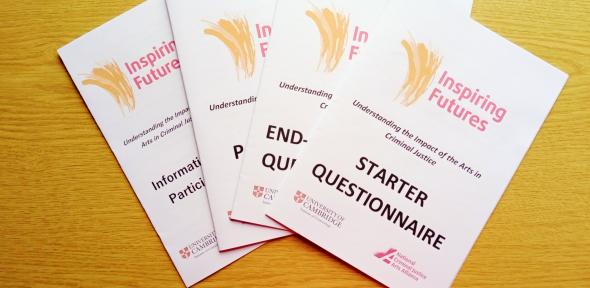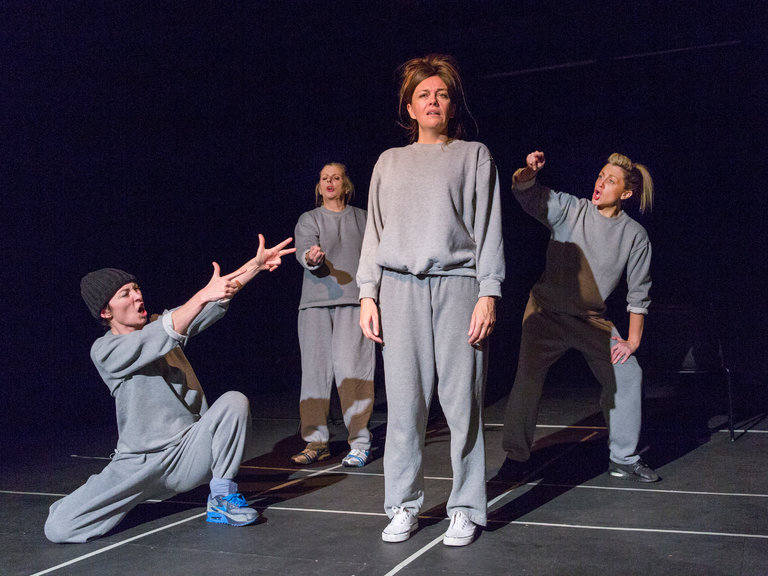Inspiring Futures: showcasing project outcomes
Inspiring Futures is an ambitious programme of work led by the National Criminal Justice Arts Alliance (NCJAA). It is a unique partnership of eight leading arts organisations providing creative work in criminal justice settings, combined with embedded participative research led by a team at the University of Cambridge Institute of Criminology (IOC). It offers an opportunity for a ground-breaking artistic programme and large-scale data collection, providing the robust evidence needed for a step-change in the profile and recognition of the arts in criminal justice.
Despite the widespread documentation of positive experiences and outcomes from arts programmes in criminal justice settings, evidence of cross-sector and long-term impact is limited. The Ministry of Justice, the Department of Digital Culture, Media and Sport, and Arts Council England have called for a more systematic and rigorous approach to arts evaluation and models of up-scaled provision which can be replicated and shared. The Inspiring Futures programme seeks to advance knowledge into why arts interventions impact the lives of people in the criminal justice system and how to optimise the effects, and to find collective solutions to systemic problems restricting the use of arts in criminal justice settings. Here, we’re giving an outline of how Inspiring Futures goes about doing that.

Seven arts organisations – selected based on their demonstrable impact on people in the criminal justice system, their innovation and their experience – have been delivering workshops in prisons and community settings around the country. The partners involved are: Clean Break, Geese Theatre Company, Good Vibrations, Helix Arts, Irene Taylor Trust, Only Connect and Open Clasp. Between them, these organisations provide work in music, theatre and visual arts; collectively, they boast well over 100 years’ experience of quality work in the field. Their work reaches people in the criminal justice system who have had little or no previous engagement with the arts, and gives access to high quality artistic activity, enabling further social and cultural engagement and reducing the likelihood of reoffending.
For Inspiring Futures, project delivery began as planned in early March 2020 – and then stopped one week later, as the whole country including prisons went into lockdown in response to the Covid-19 pandemic. The ongoing restrictions prevented much work from taking place, but some projects were able to provide work in prisons at points during this time. As prisons retained heightened restrictions long after they were lifted in the community, negotiating access to get back into prisons to provide work has been a constant struggle, but we were delighted to have been able to persevere and make up for lost time through 2022.
From January 2023, we’ll be sharing blogs with more information about each of these partners, so watch this space!
The research team at the IOC have embedded a participative research culture at every stage of the project. Using a variety of research methods including developing a comprehensive, theoretically-informed evaluation framework for measuring impact across the arts. The team have observed all the different partners in action providing creative activities in criminal justice settings, distributed start- and end-of-project questionnaires to all participants and (where possible) comparison groups, and conducted interviews with participants, staff and facilitators.

The focus now is on following up with participants approximately one year after the end of their project, to see how their arts project has impacted their lives longer-term. The team are also developing an app to be used ongoingly as a data collection tool and as a way for participants to reflect on their experiences and journeys. They will be beginning to write up and disseminate findings in 2023, so keep an eye out for new developments.
A key component of Inspiring Futures is to be able to showcase the creative work developed through the programme. The NCJAA will curate performances and exhibitions, utilising digital methods to provide mainstream platforms for new talents from marginalised groups and engaging new audiences. The research team from the IOC will be using the showcase to evaluate the wider impact of the arts in criminal justice, developing innovative and creative methods to understand how audiences engage with and are impacted by artwork produced by individuals and groups in the criminal justice system.
SAVE THE DATE: 21 March 2023.
As part of a one-day festival of Arts in Criminal Justice, the Inspiring Futures partners will be showcasing their work at Rich Mix, London. The day will bring together our network of sector specialists and stakeholders to share and reflect on the impact and future sustainability of being an arts practitioner in criminal justice settings. The installations will be made available to the public through the week, so a range of audiences will be able to see something of what Inspiring Futures has been doing.
More information including how to book will be released in January 2023.
This blog was co-written by NCJAA Support and Engagement Officer Abi Lunn and IOC Research Associate for Inspiring Futures Dr. Sarah Doxat-Pratt

About the National Criminal Justice Arts Alliance
The National Criminal Justice Arts Alliance aims to ensure all those in the criminal justice system get access to arts and culture as a springboard to positive change. We do this by providing a network for artists, arts organisations and criminal justice practitioners delivering innovative work across the country. We influence policy, improve research, encourage effective practice and raise the profile of the arts in criminal justice sector.
About the Institute of Criminology
The Institute of Criminology at the University of Cambridge has a worldwide reputation for excellence in both research and teaching. Founded by Sir Leon Radzinowicz in 1959, it was one of the first criminological institutes in Europe, and now hosts six research centres as well as academic staff with varied subject specialties, many of whom are international leaders in their fields.

featured image credit: Irene Taylor Trust (Lizzie Coombes)






